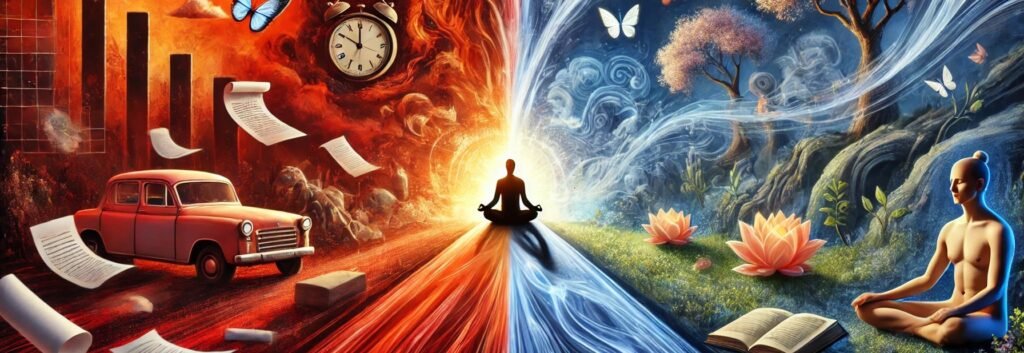Exploring Consciousness and the Mindful Journey
Consciousness is a paradox. It’s the fabric of our existence yet remains one of the most profound mysteries of human life. Philosophers, neuroscientists, and spiritual seekers have questioned the self, awareness, and act of being. What if the key to unlocking these questions lies not in grand theories but in subtle, everyday practices that reveal the nature of the witness within us—the quiet observer of all experience?
What Is the Witness?
Let’s start with the basics: who—or what—are we? Beyond our roles, names, and the narrative we construct about ourselves, there’s the observer—the part of us that watches life unfold without judgment or attachment. This distinction, often called “the self and the witness,” is central to mindfulness and the study of consciousness. As Psychology Today explains, the witness is the aspect of our awareness that is present, even when the mind is distracted by thoughts. It’s the one that notices when you’re angry, reflects on why you’re anxious, or marvels at the beauty of a sunset. Cultivating this witness isn’t just an esoteric idea; it’s a practical way to step out of the chaos of daily life and into clarity.
There is an unchanging witness to every passing thought, emotion, and sensation. Find it, and you find yourself.
Mooji
Conflict Drives Growth
Engaging with consciousness often begins with tension. Our modern lives are geared toward doing—checking off tasks, solving problems, striving for success. Sitting still, focusing on the breath, or observing thoughts without judgment feels counterintuitive, even wasteful. Yet, this very conflict is the heart of transformation. As neuroscientific research reveals, our brains are wired to learn and adapt through mistakes and conflict. We create space for growth when we pause and observe instead of reacting impulsively. The witness becomes visible in this pause, helping us shift from reacting to responding.
The path to truth is littered with the ruins of certainties.
Alfred North Whitehead

The Ticking Clock of the Present Moment
Why should we care about cultivating awareness? Because life, in all its beauty and brevity, is slipping through our fingers. Mindfulness reminds us that every moment is fleeting—a chance to engage fully or let it pass unnoticed. Think of your day: how many moments were spent mindlessly scrolling through your phone? How many passed without a single thought of gratitude? By becoming aware of the ticking clock, mindfulness transforms time from something we try to outrun into something we savor.
In the stillness, the world is not empty, but full of presence.
Martin Heidegger
Ignorance vs. Awareness
One of the more surprising insights about consciousness is our resistance to awareness. Studies have shown that people often choose ignorance, even when awareness could lead to better outcomes. Why? Because confronting the truth can be uncomfortable. Mindfulness challenges this tendency. By gently observing discomfort instead of avoiding it, we discover that the things we fear aren’t as overwhelming as they seem. Awareness becomes a tool for liberation, breaking the cycle of avoidance and enabling us to live more authentically.
The eye sees only what the mind is prepared to comprehend.
Henri Bergson
Altering Consciousness
Research into mindfulness-based programs reveals that these practices can induce lasting changes in our consciousness—sometimes up to a year after initial training. This isn’t about achieving mystical experiences but about reshaping how we experience life. Through mindfulness, the ordinary becomes extraordinary. A walk in the park isn’t just a walk; it’s a symphony of sensations, from the crunch of leaves underfoot to the warmth of sunlight on your face. This shift in perception is consciousness evolving in real-time.

Expanding Consciousness
Is It More Than the Brain? Beyond mindfulness lies an even deeper question: is consciousness purely a product of the brain, or is it something more? Some theories suggest that consciousness may exist as a fundamental dimension of reality, much like time or space. While these ideas remain speculative, they offer a compelling perspective: our journey inward might also connect us to something universal. The witness within could be a doorway to understanding ourselves and the nature of existence.
Why Love Is the Answer
At its core, mindfulness isn’t just about observing life; it’s about engaging with it to foster love and connection. Whether it’s love for yourself, others, or the world, mindfulness teaches us how to show up with compassion. As Psychology Today notes, this is how we transcend isolation and build bridges of understanding. In this context, love isn’t merely an emotion; it’s a state of being. It’s what happens when we let go of judgment and meet each moment with openness.

Transcending the Matrix of Conditioning
Finally, mindfulness offers a way to step outside the societal and mental conditioning that often defines us. As described in Psychology Today, transcending the “matrix” means seeing life not through the lens of what we’ve been taught but through direct experience. This doesn’t mean rejecting the world but engaging with it more authentically. By stepping outside habitual patterns, we open ourselves to freedom and possibility.
When you release the belief that you are what you’ve been taught to see, you glimpse the infinite.
Nisargadatta Maharaj
An Invitation to Explore
The journey into consciousness is both universal and deeply personal. It doesn’t require grand gestures or drastic changes—just a willingness to pause, breathe, and notice. As you begin cultivating the witness within, you might find that the answers you seek were with you all along. So, what might you discover if you stopped and listened? Let the exploration begin.

